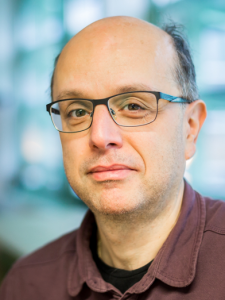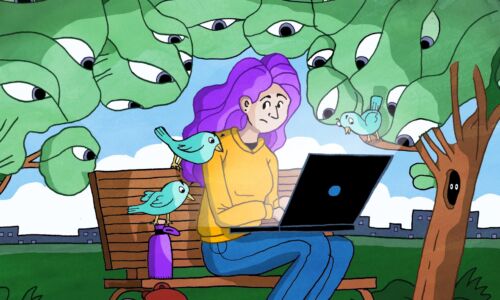-
 via Pixabay
via Pixabay
What are we going to do with AI in education? Instead of prohibiting it and doing everything possible to detect plagiarism, enthusiastic students and teachers see the many possibilities the technology has for studying and education.
You ask the computer a question and you get an elaborate answer. ChatGPT and other types of generative AI (the automatic generation of text or other forms of media with use of artificial intelligence) makes the life of many students a lot easier.
This forces teachers and the university to also have an opinion on the matter. It already led to the note Education and generative AI which is used as guideline for the use of AI in education in Nijmegen. The note says that the university looks at generative AI with an open -but critical- mind, and it advises making students aware of the technology and the caveats it comes with. Undesirable use of AI for exams should be labelled as fraud, the writers say. The note is set to be established soon.
Talking with ChatGPT
One of the students who already uses generative AI is Bente. The philosophy student uses it in several different ways. ‘I use ChatGPT to make studying more fun. For example, while I was preparing for the exam Language Philosophy, I talked with ChatGPT about the contents. Because where my attention span weakens after half an hour of reading, I spent two hours talking to ChatGPT about the subject, where I learned because I had to correct ChatGPT. You are forced to look at the subject in great detail.’
Bente explains that she also uses ChatGPT to study foreign languages by talking in a different language about specific topics. She also uses AI programs for research. ‘There’s already a program which let you talk to a pdf; you can ask question about the contact of that pdf. And there is Elicit, a search engine which you can use to collect scientific literature.’

‘Students use AI for their studying. It’s a fact, and it will not go away again, so as a teacher and university you have to be clear on what your position is,’ Luca Consoli says, researcher and professor at the Institute of Science in Society. Consoli says he’s interested in the background of generative AI, the advantages and disadvantages of it and the question of how to use it responsibly.
A selective use of the technology is necessary, Consoli thinks. How useful is the information the technology gives and is it clear to the students how the program comes to this result? ‘Some students in my group have added ChatGPT as an extra group member. I think it’s a good idea to see what the program can contribute.’
Social interaction
Being critical does not just mean looking for mistakes, according to Bente. ‘There are a lot of people who put emphasis on ChatGPT giving wrong information. I don’t see that as criticism of AI in general, because the system is so new still. Researchers are working really hard on improving this problem.’
The student would rather talk about when or when not to use AI. ‘Technology should never be a goal in itself in education; it should always be about the where, when and why.’ Bente hopes that AI will not be used as a substitute for social interaction. The possibility to have a conversation with each other should not be replaced by technology. ‘People are by nature social creatures, and social relationships can motivate going to campus, or can help to reduce stress.’
‘A teacher can save time because exams are being checked by bots’
Bente mainly sees AI as a way to save time. ‘When AI is used properly, as a means to analyse and transport information, then a teacher can save time because exams are being checked by bots, or because PowerPoints are being made a lot faster using an AI-tool.’
ChatGPT can write articles and essays according to its user’s demands. This has fuelled the fear of plagiarism by students. ‘Students who say they are the author of a piece written by AI are actually committing plagiarism,’ according to Steven Trooster, an employee of education support who keeps track of the developments of generative AI. Trooster thinks the technology might lead to different types of testing. Someone who previously let their students write essays at home might now use the controlled digital environment of the Comeniuslaan. ‘Or it can switch to oral exams or making video presentations.’
The calculator
Luca Consoli is hesitant to use something like detection software against plagiarism because of AI use. ‘I don’t think you should start with distrust. Maybe you could do sample-wise checks to see if there is any plagiarism. But I would much rather prefer to use my energy to show students how to use the technology responsibly.’
Generative AI is not the first technological development which threw the educational world upside down. Before, the calculator had a similar effect, Consoli and Bente say. Just like you teach mathematicians to do difficult calculations in their head after which they are allowed to use a calculator, you could teach students in the argumentation analysis to differentiate between main- and side topics, and let them use the chatbot afterwards to see what answer that comes up with. Consoli: ‘No one is against the use of calculators, but you will have to know when they are talking nonsense.
And that is exactly the problem with ChatGPT right now, Steven Trooster says: it still mainly just adds some words together. ‘Whereas you learn to really formulate your thoughts in a scientific environment. Writing it yourself helps you understand it.’
But the technology can still help teachers. Programs can help to turn the material into a PowerPoint presentation. They can be used to come up with questions; to brainstorm; you can ask ChatGPT if there’s a cultural or another type of bias in your text.
‘We shouldn’t fear AI itself, but the way humans use AI’
According to Luca Consoli, the use of it by teachers also raises ethical questions: ‘Will you let the program write the syllabus? Or let it come up with example answers to the exam questions? You cannot just do that. As a teacher you should always have the final responsibility on your subject.’
When using generative AI, one should also think about their dependence on big tech companies which control this market. Apart from this, it also costs enormous amounts of electricity to make it al work, it’s not transparent which sources are being used, and there are copyright and privacy complaints, according to Consoli.
‘We shouldn’t fear AI itself,’ Bente says, ‘but the way humans use AI. It would be a waste if we miss opportunities because we only reason based on fear. Education always asks for customization, and generative AI could add to this.’
Translated by Lara Nijhof



